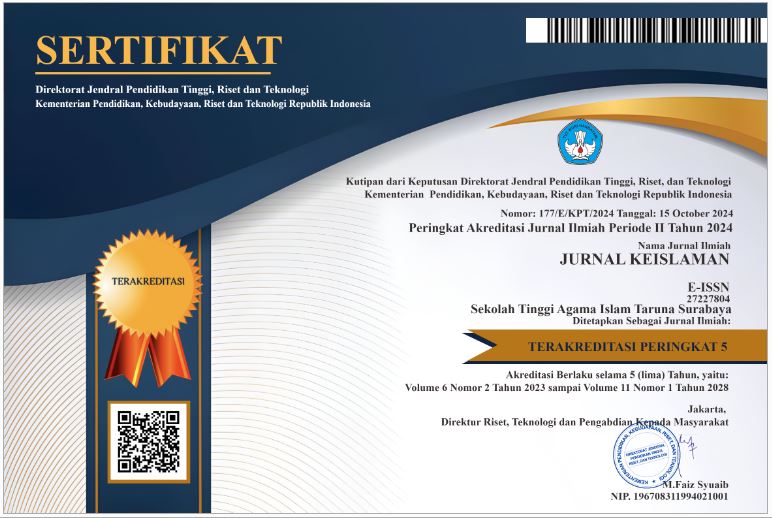Kearifan Lokal: Moderasi Beragama Dan Budaya Patriarki Dalam Sebuah Pertentangan Perspektif Hak Asasi Manusia
DOI:
https://doi.org/10.54298/jk.v7i1.241Keywords:
Religious Moderation, Patriarchal Culture, ViolenceAbstract
This research aims to find out how various moderation indicators are implemented regarding the community's cultural acceptance of the application of patriarchal culture and what form of government protection there is against acts of violence against women due to the application of patriarchal culture from a Human Rights perspective. Through normative research methodology, the research results show that Islam is a religion that is rahmatan lil'alamin which will not give a negative stigma to men or women. Thus, the position of men and women in Islam is the same. After marriage, the wife's responsibility will shift to the husband and this is a respect given by Islam to a woman. Apart from that, it was also explained that the best Muslim man is one who treats his wife well. Of course, this will get better if it is accompanied by an understanding of the concept of good religious moderation. Because no matter what, culture will continue to follow the flow of habits that have been adopted by society. However, the existence of moderate religion can save the life of the nation and state. Apart from that, it is further regulated in Article 27 paragraph (1) of the 1945 Constitution of the Republic of Indonesia, that Indonesia recognizes the principle of equality. This principle of equality applies to all Indonesian people. Recognition of the principle of equality in the Indonesian constitution leads to the elimination of discrimination, therefore, whoever we are as long as we are Indonesian citizens have the right to receive equal treatment before the law. Equal treatment before the law does not look at a person's ethnicity, religion, gender or even position. This indicates that Indonesia as a sovereign country legally recognizes the principle of equality. This means that according to legal instruments in statutory regulations, the position of men and women is equal. However, even though legal instruments are in place, in the context of implementing these legal instruments, discrimination and injustice towards women are often still visible.
Downloads
References
Ade Irma Sakina dan Dessy Hasanah Siti, tt, Menyoroti Budaya Patriarki di Indonesia, Social Work Jurnal, Vol. 7 Nomor 1
Agus Akhmadi, Moderasi Beragama Dalam Keragaman Indonesia Religious Moderation in Indonesia Diversity, Jurnal Diklat Keagamaan, Vol. 13 No. 2, Pebruari-Maret 2019
Badan Litbang dan Diklat Kementerian Agama Republik Indonesia, Tanya Jawab Moderasi Beragama, Jakarta: Kementerian Agama RI, 2019
Bhikhu Parekh, Rethinking Multiculturalisme: Cultural Diversityand Political Theory, Yogjakarta: Kanisius, 2012
Direktorat Jenderal Pendidikan Islam Kementerian Agama Republik Indonesia, tt,Pedoman Implementasi Moderasi Beragama Dalam Pendidikan Islam, Jakarta: Kementerian Agama RI
Irianto, Perempuan dan Hukum, Jakarta: Yayasan Obor Indonesia, 2006
KBBI, Kamus Besar Bahasa Indonesia, cet. III, Jakarta: Balai Pustaka, 2001
Kementerian Agama Republik Indonesia, Implementasi Moderasi Beragama Dalam Pendidikan Islam, Jakarta: Lembaga Daulat Bangsa, 2019
Khalil Nurul Islam, Moderasi Beragama Di Tengah Pluralitas Bangsa: Tinjauan Revolusi Mental Perspektif Al-Qur’an, Kuriositas 13, No. 1, 2020
Lusia Palulungan, dkk., Perempuan, Masyarakat Patriarki & Kesetaraan Gender, Makassar: Yayasan Bakti, 2020
Maskuri Maskuri, A. Samsul Ma’arif, and M. Athoiful Fanan, Mengembangkan Moderasi Beragama Mahasantri Melalui Ta’lim Ma’hadi di Pesantren Mahasiswa, J-PAI: Jurnal Pendidikan Agama Islam 7, No. 1, 2020
Muhaimin, Rostorative Justice Dalam Penyelesaian Tindak Pidana Ringan, Jurnal Penelitian Hukum De Jure, Vol. 19, No. 2 Juni 2019
Muladi, Kapita Selekta Sistem Peradilan Pidana, Semarang: Badan Penerbit Universitas Diponegoro, 1995
Moerti Hadiati Soeroso, Kekerasan Dalam Rumah Tangga Perspektif Yuridis-Viktimologi, Jakarta: Sinar Grafika, 2010
Putri Septi Pratiwi, Mia Putri Seytawati, and Ahmad Fauzan Hidayatullah, “Moderasi Beragama Dan Media Sosial (Studi Analisis Konten Instagram & Tik-Tok”, Jurnal Dakwah Dan Komunikasi 16, No. 1, 2021
Wildani Hefni, Moderasi Beragama Dalam Ruang Digital: Studi Pengarusutamaan Moderasi Beragama di Perguruan Tinggi Keagamaan Islam Negeri, Jurnal Bimas Islam 13, No. 1, 2020.
Downloads
Published
How to Cite
Issue
Section
License
Copyright (c) 2024 Diah Ratri Oktavriana, Nasiri, Yamani, Achmad

This work is licensed under a Creative Commons Attribution-ShareAlike 4.0 International License.
Authors who publish with this journal agree to the following terms:
- Authors retain copyright and grant the journal right of first publication with the work simultaneously licensed under a Creative Commons Attribution-ShareAlike 4.0 that allows others to share the work with an acknowledgement of the work's authorship and initial publication in this journal.
- Authors are able to enter into separate, additional contractual arrangements for the non-exclusive distribution of the journal's published version of the work (e.g., post it to an institutional repository or publish it in a book), with an acknowledgement of its initial publication in this journal.
- Authors are permitted and encouraged to post their work online (e.g., in institutional repositories or on their website) prior to and during the submission process, as it can lead to productive exchanges, as well as earlier and greater citation of published work (See The Effect of Open Access).


















